Six Months Later, an Oil Disaster Spreads Across the Gulf
By Rocky Kistner. Cross-posted from NRDC Switchboard.
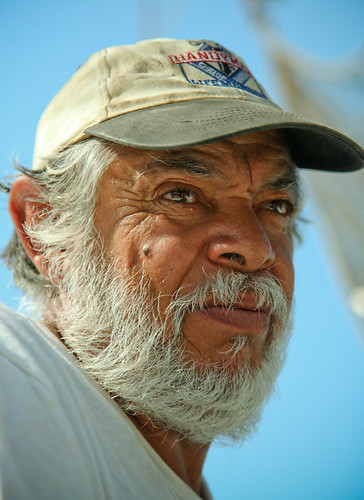
For six months, I have lived and worked near ground zero of the worst oil disaster in US history. I’ve traveled on boats hunting thick, reddish peanut butter-colored crude that slowly washed towards the coastal marshes of southern Louisiana. I watched tough, resourceful people of the bayou weep at the sight of the oily tide invading precious fishing grounds.
It’s been an exhausting yet exhilarating experience, and I have grown close to people in this community. I’ve gotten to know fishing families that are struggling with possible health risks to their children. I’ve watched divisions and conflicts rise up between fishermen who have been paid to work for BP on the cleanup and those that never got a dime. I’ve lived here and learned a lot in the process, including rule number one: never get in a boat with someone who doesn’t know their way around the bayou. You’ve never lived until you get stranded on a sandbar in the delta bayou at night and have to swim in the dark through the muddy, alligator-infested waters to safety.
But there was one experience I’ll always remember. I was at a Port Sulphur LA town hall meeting with BP money czar Ken Feinberg when news broke that the BP well was plugged. After 87 days of anxiety and repeated failures to tame the beast, the news was met with mere tepid applause. People were tired and scared of the future. They knew the real test was ahead of them.
Once the well was plugged, it didn’t take long for the media to pull out. Without dramatic visuals of a volcano of crude gushing from the bottom of the sea, there were other stories to pursue. But even though most media left, the oil never did. It still washes in with the tide as tar balls and sheen, visible when boat engines kick up the mud in the shallow waters of the marsh.
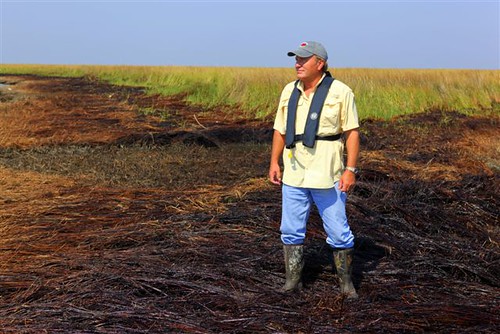
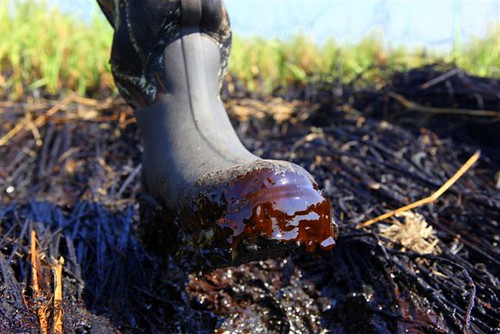
Photos by PJ Hahn/Plaquemines Parish in Barataria Bay, October, 2010.
Despite the protests of many fishermen concerned about oil on the bottom, the fishing grounds are nearly all open. But Gulf seafood markets have crashed. America refuses to buy it and some fishermen can’t pay for the gas for their boats with the price they’re getting for shrimp at the docks.
“It’s hardly worth it to go out,” said Marvin Smith, who parked his boat in the Venice commercial docks last week to unload a night’s catch of white and brown shrimp. “They pay less than two dollars a pound, but I got to go out and get them while I can.” Smith looked wearily out at the harbor. He would head out again that night, but the market price was not about to change.
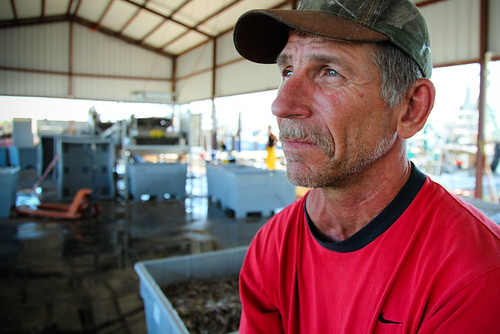
Venice commercial fisherman Marvin Smith Photo by Lisa Whiteman/NRDC
I’ve met plenty of fishermen like Marvin over the past six months as a part of a NRDC communications team staffing our Gulf Resource Center in Buras, a once thriving fishing community devastated by Katrina five years ago. People here were close to rebuilding their lives after the storm, only to be hammered by the oil disaster this year.
Buras, once the commercial center of the southern bayou of Plaquemines Parish, is a shell of its former self after 20 feet of water leveled the town five years ago. The town has no real grocery store, and the schools haven’t been rebuilt. A refrigerator still hangs in a tree near the main road and broken homes and stores litter the landscape.
“A lot of people here are hurting because fishing is the only life they know,” says Mike Brewer, an oil clean-up consultant who ran for the local Parish council this fall. “They are trying to get back on their feet but no one knows what the future holds. It’s going to be a painful winter for a lot of folks here.”
The pain really began last May for many in this area when the oil first poured into nearby Barataria Bay after threatening the coast for a month. That’s when commercial fisherman Mike Roberts took his grandson out on a boat ride to see the damage for himself. When he returned to his home, he was in such a state of shock he couldn’t sleep. So in the wee hours of the night, he wrote about his experience that day. He called it the Summer of Tears. Below is an excerpt:
I tried not to let my grandson, Scottie, see me crying. I didn’t think he would understand, I was crying for his stolen future. None of this will be the same, for decades to come. The damage is going to be immense and I do not think our lives here in South Louisiana will ever be the same. He is too young to understand. He has an intense love for our way of life here. He wants to be a fisherman and a fishing guide when he gets older. It is what he is, it is in his soul, and it is his culture. How can I tell him that this may never come to pass now, now that everything he loves in the outdoors may soon be destroyed by this massive oil spill? How do we tell this to a generation of young people, in south Louisiana who live and breathe this bayou life that they love so much, could soon be gone? How do we tell them? All this raced through my mind and I wept.
These thoughts still plague fishermen here. They know the bayous like the back of their hands. Many people here know the oil is not gone, and they worry their lives will never be the same. Government assurances that the waters are safe for fishing just don’t wash with many of them. Scientistific reports that the marsh is recovering and the oil damage may not be as bad as once thought are met with skepticism by the fishing community here. They know something’s not right, the shrimp aren’t in the normal places and the large ones don’t seem to be migrating out to sea as they normally do this time of year.
I’ve seen numerous samples of shrimp people have saved with a black substance in their gills. Just this week, an NRDC colleague was taking photos at the Venice marina when she was shown a large grey shrimp by an irate fisherman who claimed the gills were full of hydrocarbons. Is it oil? We don’t know, but people have to choose between catching and selling these shrimp or starving themselves. It’s a damned if you do, damned if you don’t situation for them. And it’s causing tension in the community.
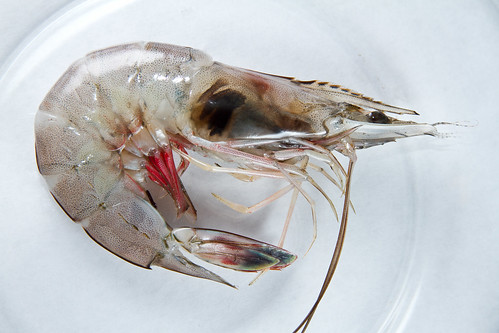
Shrimp with black tar-like gills from Venice marina, Oct. 18, 2010
Photo by Anthony Clark/NRDC
When the government says the oil is gone or dispersed and the seafood is safe—even going into the local schools to convince children—it doesn’t go over very well with some people here. They have heard too many stories of oil turning up in crabs and shrimp, too many instances where shrimp boats have churned up sheen behind their nets as they’ve dragged the bottom.
“If anyone wants to eat the shrimp here then that’s their decision,” says Kindra Arnesen, wife of a fisherman in Venice and a representative of the Louisiana Coastal Heritage Society. “But I’m not feeding it to my kids until I know it’s safe. And I don’t have much faith the government knows what’s safe and what isn’t.”
Apparently, most of the rest of America agrees. BP’s $100 million PR campaign may convince some that it will “make it right” in the Gulf, but it isn’t helping change attitudes about buying the seafood here. According to fishermen and dock owners, the shrimp market price is as bad as it’s been in a long time.
But the price of shrimp isn’t the only problem down here. The real tragedy after this disaster is that the oil industry will continue to threaten the natural resources of the Gulf. With nearly 50,000 oil and gas wells bored into Gulf, including nearly 4,000 active oil platforms, and the deepest offshore platform in the world that is operated by a consortium of companies including, you guessed it, BP. There is little guarantee this catastrophe won’t happen again. More deepwater wells will be drilled; more oil and gas pipelines will crisscross the Gulf marshes, contributing to a loss of 15,000 acres every year. Unless dramatic action is taken to restore these wetlands and change our destructive shipping and oil production habits, there will be nothing left a generation from now.
Meanwhile, economic and political forces are spearheading the campaign to forget this disaster continue their assault. The fishermen and coastal residents fear they will be forgotten and lost in the bureaucratic maze of a bungled claims process. They’ve seen it before with Katrina. But they fear this will be worse.
Laura Olson, a research scientist with George Washington University’s Institute for Crisis, Disaster and Risk Management, spent the past five years studying the communities in Plaquemines Parish. In a recent report, she described a community pushed to the brink by the BP oil disaster.
Post oil spill, there has been a dramatic rise in incidents of domestic violence within families. In Plaquemines Parish, in the first quarter 2010, there were 32 reported incidents of domestic violence while in the second quarter of this year since the oil spill began the number of reported incidents more than doubled to 68 reported incidents. Experience within the local practitioner communities and recorded in national mental health research predict that substance abuse, child abuse, financial worries, depression, suicide and other negative impacts can be expected to manifest themselves increase numbers in the impacted communities.
One of those struggling with the economic toll of this disaster is JJ Creppel, a Houma Nation tribal member who lost his boat, had a heart attack and never got a day working on the BP cleanup that has ruined his livelihood. He is hoping to get a small boat to fish and feed his family now living on handouts from friends and a patchwork of charities. “I’m a survivor,” he said of his Native American ancestors. But this oil disaster is one of the hardest challenges he's faced.

Buras fisherman JJ Creppel Photo by Lisa Whiteman/NRDC
People like JJ can only survive if we put the right policies in place. Six months after this disaster, the crude will soon be flowing out of the deep wells in the Gulf. The drilling moratorium has been lifted. BP—and its oil behemoth competitors—will soon be back at it, sucking petroleum out of the seabed to feed our insatiable demand for oil and gas.
The fishermen of the Gulf coast know how dangerous it can be to their fishing grounds, yet they feel powerless to stop it. Nearly every fishing family in the Gulf has relative or close friends who depend on the oil business. Who else will put people to work, they ask?
“We’ve got to get off oil,” says Louisiana fisherman Cristian Delano. “We can do everything possible to try to make it safe but there’s no way to prevent this from happening again. We’ve got to find another source of energy or we’ll be buying the technology from some other country like China.”
That’s really the only way to solve this problem. Every president since Nixon has talked about getting off oil but we’ve done a pitiful job doing it. We send billions of dollars overseas buying a product that threatens our national security and supports potential adversaries. There are alternatives we can turn to, such as the recently announced billion-dollar project to create wind farm transmission lines off the east coast. There’s no reason we can’t push these technologies here in the Gulf.
Truth is, most residents and fishermen in the bayou aren’t focused on energy alternatives. They’re just praying that six months from now the shrimp will return to the fishing grounds untarnished, the oyster beds will recover and tar balls will cease peppering the marshes and beaches. Let’s hope we all learn from this disaster. Congress needs to take action now to restore and protect the Gulf to enforce tough safety requirements and hold the oil industry accountable for the damage it’s done. We need Congress to act now and create new policies that reduce our oil addiction and promote clean energy technologies. Only then can Gulf coast residents--and all of us--feel safe that disasters like this never happen again.
